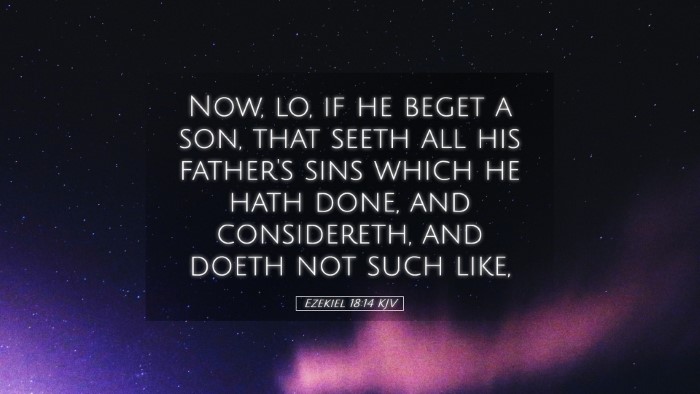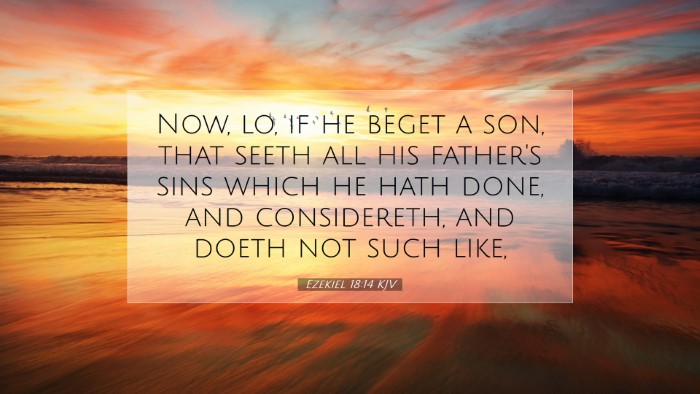Ezekiel 18:14 - A Commentary
Ezekiel 18:14 states:
"Now, lo, if he beget a son, that seeth all his father’s sins which he hath done, and considereth, and doeth not such like."
Overview
This verse comes from the heart of Ezekiel's discourse on individual responsibility and righteousness. It emphasizes the distinction between the actions of the fathers and the responses of their sons, reiterating the principle that each person is accountable for their own behavior before God.
Commentary Insights
Understanding the Context
To fully grasp the significance of Ezekiel 18:14, it is essential to understand the context of Ezekiel's prophecies. The key theme throughout chapter 18 is the assertion that personal responsibility is paramount. Matthew Henry highlights that "the soul that sins, it shall die," indicating that each individual is judged based on their own actions rather than their lineage.
Parental Influence and Individual Responsibility
- Albert Barnes' Perspective: Barnes notes that while fathers may have a significant influence on their children, the latter are not destined to follow in their evil ways. He emphasizes that a son can witness his father's sins and choose to forsake them, asserting his own moral agency.
- Adam Clarke's Insights: Clarke elaborates on the moral implications of Ezekiel’s words. He points out that a wise son will reflect on his father's actions, and unlike him, he will choose righteousness over wickedness. The emphasis is on self-examination and the pursuit of a godly life.
The Role of Consideration
The phrase, "that seeth all his father’s sins which he hath done, and considereth," suggests a deep level of contemplation and awareness. It is not enough for the son merely to observe his father's sins; he must actively consider them and the consequences they carry. This idea aligns with Henry’s teaching that true wisdom is the ability to learn from the failures of others.
Application to the Community
Ezekiel 18:14 also has implications for the community of believers. It serves as a reminder that while we may inherit tendencies from our families, each member of the community is called to rise above their background. Barnes posits that this teaches us accountability not just individuals but also collectively, calling communities to support one another in fostering righteousness.
Moral Implications
The verse supports the concept that moral decisions are intrinsically linked to one's spiritual condition. Clarke notes that a son’s choice to abstain from his father’s sins reflects an internal moral compass directed towards righteousness, which is a significant theme in the teachings of both the Old and New Testaments.
The Call to Righteousness
Ultimately, Ezekiel 18:14 serves a dual purpose: it addresses both parents and children, urging them to live righteously. Henry emphasizes that the opportunities for redemption and change are available to all, regardless of past sins. Thus, this verse stands as a beacon of hope for individuals and families, illustrating that God’s justice allows for personal transformation and accountability.
Theological Implications
This verse invites deeper theological reflection on the nature of sin, mercy, and divine justice. It asserts that each person can choose their path, countering deterministic views regarding sin inherited from one's ancestors. In this light, God’s grace becomes evident in the choices available to individuals, encouraging a relationship with Him based on personal faith rather than familial affiliation.
Conclusion
Ezekiel 18:14 profoundly encapsulates the essence of biblical teaching about personal responsibility and the potential for change. It reassures believers that one’s past does not dictate their future, and the call for righteousness is a universal call extending beyond familial patterns. As we contemplate this verse, it invites us to reflect on our own lives and the choices we make in light of God’s expectations.


